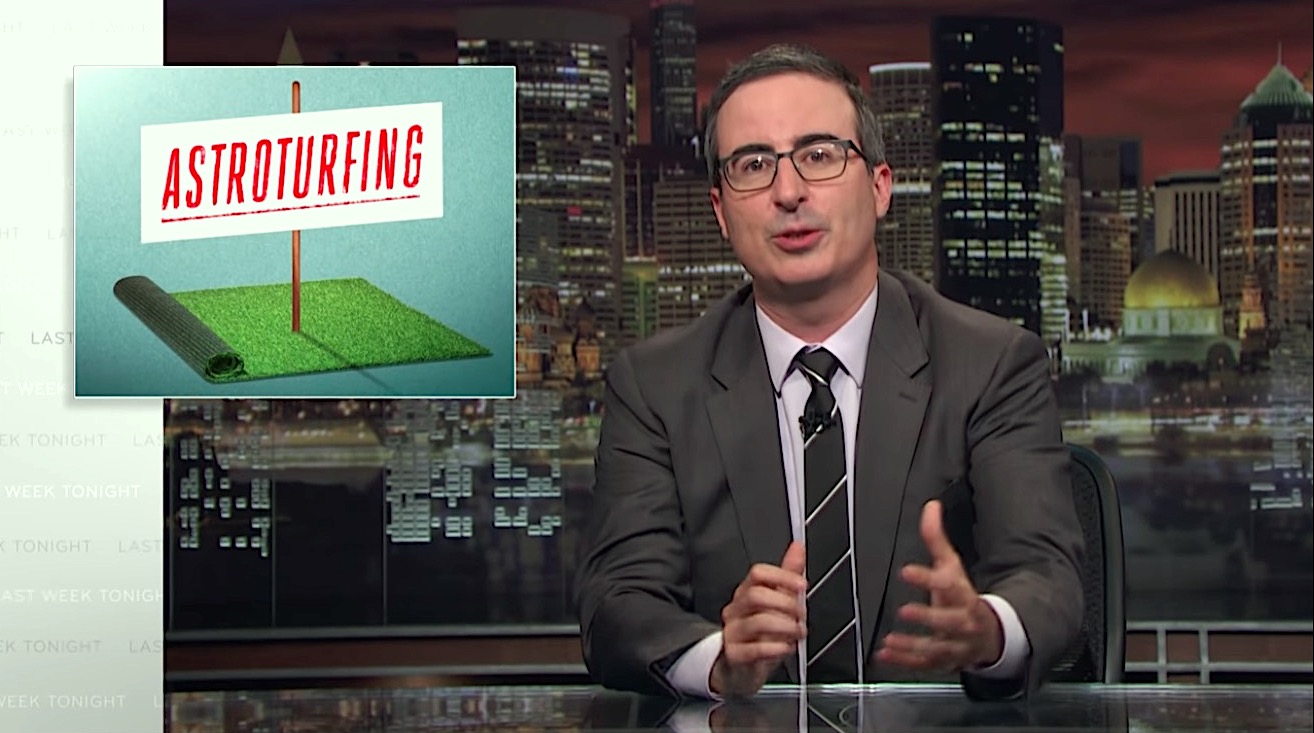John Oliver explains how to spot 'astroturfing,' admits it isn't easy, warns that cynicism is 'toxic'


A free daily email with the biggest news stories of the day – and the best features from TheWeek.com
You are now subscribed
Your newsletter sign-up was successful
On Sunday's Last Week Tonight, John Oliver tackled the phenomenon of "astroturfing," and he kicked it off with a pretty vulgar joke. Then he got down to business: "Astroturfing is the practice of corporations or political groups disguising themselves as spontaneous, authentic popular movements. It's basically fake grassroots — that's why they call it 'astroturfing.'" Some of these campaigns are pretty obvious, he said, playing one example, but "with dark money surging in the wake of decisions like Citizens United, astroturfing techniques are becoming more sophisticated, effective, and dangerous, and they are not going away."
Oliver proposed exploring those techniques "to better spot them in the future," and he started with the nomenclature, specifically the gallingly deceitful names some groups adopt. He used the work of one notorious adman, Richard Berman, as an example. Astroturfing front groups also sometimes hire "expert" witnesses. And in "one of the most infuriating tools of astroturfing," he said, some groups pay protesters to demonstrate on their behalf — and there are companies like Crowds on Demand that offer those services.
Conspiracy theorists now claim Crowds on Demand provides actors in all sorts of real situations, like the Las Vegas shooting, which is "hugely dangerous," Oliver said. "The consequences of this cannot be that everyone assumes that anyone who doesn't agree with them is astroturf. While skepticism is healthy, cynicism — real cynicism — is toxic." And until "we find out a way to force astroturf groups to be more transparent and accountable," our common sense is our best tool, he said. He ended with an anti-astroturfing ad — pay attention to who purportedly sponsored it. (The video is frequently NSFW.) Peter Weber
The Week
Escape your echo chamber. Get the facts behind the news, plus analysis from multiple perspectives.

Sign up for The Week's Free Newsletters
From our morning news briefing to a weekly Good News Newsletter, get the best of The Week delivered directly to your inbox.
From our morning news briefing to a weekly Good News Newsletter, get the best of The Week delivered directly to your inbox.

A free daily email with the biggest news stories of the day – and the best features from TheWeek.com
Peter has worked as a news and culture writer and editor at The Week since the site's launch in 2008. He covers politics, world affairs, religion and cultural currents. His journalism career began as a copy editor at a financial newswire and has included editorial positions at The New York Times Magazine, Facts on File, and Oregon State University.
-
 5 blacked out cartoons about the Epstein file redactions
5 blacked out cartoons about the Epstein file redactionsCartoons Artists take on hidden identities, a censored presidential seal, and more
-
 How Democrats are turning DOJ lemons into partisan lemonade
How Democrats are turning DOJ lemons into partisan lemonadeTODAY’S BIG QUESTION As the Trump administration continues to try — and fail — at indicting its political enemies, Democratic lawmakers have begun seizing the moment for themselves
-
 ICE’s new targets post-Minnesota retreat
ICE’s new targets post-Minnesota retreatIn the Spotlight Several cities are reportedly on ICE’s list for immigration crackdowns
-
 ‘One Battle After Another’ wins Critics Choice honors
‘One Battle After Another’ wins Critics Choice honorsSpeed Read Paul Thomas Anderson’s latest film, which stars Leonardo DiCaprio, won best picture at the 31st Critics Choice Awards
-
 A peek inside Europe’s luxury new sleeper bus
A peek inside Europe’s luxury new sleeper busThe Week Recommends Overnight service with stops across Switzerland and the Netherlands promises a comfortable no-fly adventure
-
 Son arrested over killing of Rob and Michele Reiner
Son arrested over killing of Rob and Michele ReinerSpeed Read Nick, the 32-year-old son of Hollywood director Rob Reiner, has been booked for the murder of his parents
-
 Rob Reiner, wife dead in ‘apparent homicide’
Rob Reiner, wife dead in ‘apparent homicide’speed read The Reiners, found in their Los Angeles home, ‘had injuries consistent with being stabbed’
-
 Hungary’s Krasznahorkai wins Nobel for literature
Hungary’s Krasznahorkai wins Nobel for literatureSpeed Read László Krasznahorkai is the author of acclaimed novels like ‘The Melancholy of Resistance’ and ‘Satantango’
-
 Primatologist Jane Goodall dies at 91
Primatologist Jane Goodall dies at 91Speed Read She rose to fame following her groundbreaking field research with chimpanzees
-
 Florida erases rainbow crosswalk at Pulse nightclub
Florida erases rainbow crosswalk at Pulse nightclubSpeed Read The colorful crosswalk was outside the former LGBTQ nightclub where 49 people were killed in a 2016 shooting
-
 Trump says Smithsonian too focused on slavery's ills
Trump says Smithsonian too focused on slavery's illsSpeed Read The president would prefer the museum to highlight 'success,' 'brightness' and 'the future'
